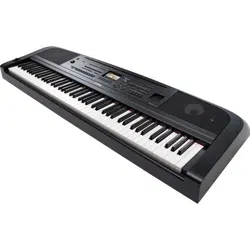Loading ...
Loading ...
Loading ...

DGX-670 Owner’s Manual
15
Panel Controls and Terminals
Using a Keyboard Stand and Pedal Unit
(Sold Separately)
A separately sold LP-1B/LP-1WH pedal unit can be
connected to the [PEDAL UNIT] jack. When
connecting the pedal unit, make sure to also assemble
the unit on the separately sold L-300B/L-300WH
keyboard stand. The L-300B/L-300WH keyboard stand
is designed to be used for multiple models. When
assembling the keyboard stand for the DGX-670, make
sure to use the screw holes indicated by “B” on the metal
brackets of the stand. For details, refer to the assembly
manual of the stand.
NOTE
• Make sure that the power is off when connecting or
disconnecting the pedal unit.
• Do not press the pedals while turning the power on. Doing this
changes the recognized polarity of the pedals, resulting in
reversed operation.
Pedal Unit Functions
By default, the following functions are assigned to each
pedal.
Damper Pedal (Right)
Pressing this pedal will sustain notes longer. Releasing
this pedal immediately stops (damps) any sustained
notes.
When you select a VRM Voice (page 41), pressing this
pedal activates the VRM to accurately recreate the
unique resonance of an acoustic grand piano’s
soundboard and strings.
Sostenuto Pedal (Center)
If you play a note or notes on the keyboard and press the
sostenuto pedal while the note(s) are held, those notes
will sustain as long as you hold the pedal (as if the
damper pedal had been pressed) but all subsequently
played notes will not be sustained. This makes it
possible to sustain a note or notes, for example, while
other notes are played “staccato.”
Soft Pedal (Left)
The soft pedal reduces the volume and slightly changes
the timbre of notes played while the pedal is pressed.
The soft pedal will not affect notes that are already
playing when it is pressed.
Half Pedal function (for FC3A and LP-1B/
LP-1WH)
The FC3A and the right pedal of the LP-1B/
LP-1WH have a Half Pedal function which allows
you to use half-damper techniques, in which the
damper is pressed somewhere between all the way
down and all the way up. In this half-damper state
(on a real piano), the damper felts only partially
mute the strings. The Half Pedal function lets you
delicately and expressively control the damper
muting, and create subtle nuances in your
performance, by finely controlling the point at
which pressure on the pedal affects the damper
muting. The point is called “Half Pedal Point” and
can be set on the Pedal tab of the Controller display
called up via the [MENU] button (page 100).
LP-1B/LP-1WH
(Sold separately)
L-300B/L-300WH
(Sold separately)
Rear side
If you press and hold the damper pedal here,
all the notes shown will be sustained.
If you press and hold the sostenuto pedal here,
only the notes held at this timing will be
sustained.
Loading ...
Loading ...
Loading ...
